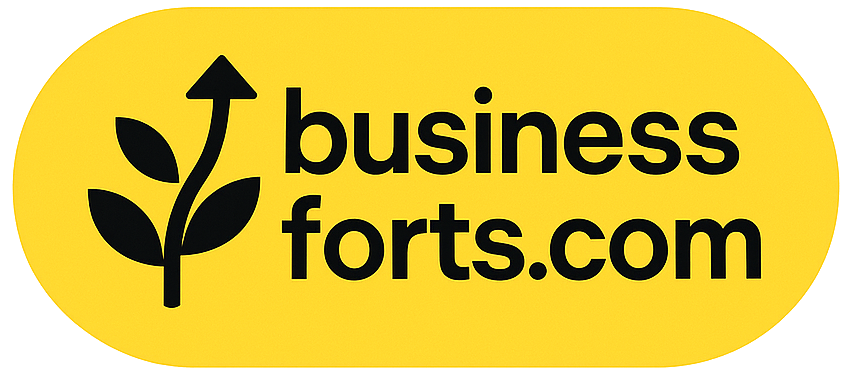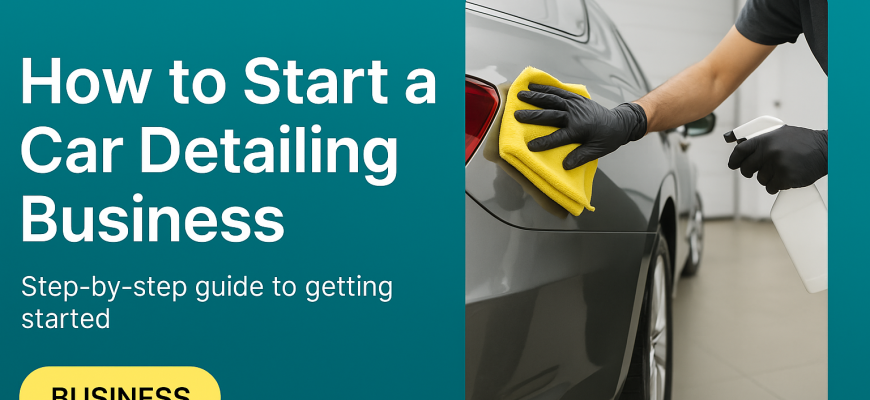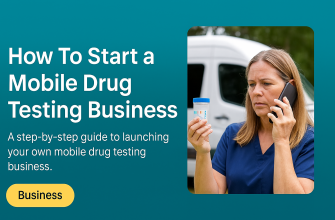Starting a car detailing business can be an exciting and profitable venture – and yes, women absolutely belong in this industry. If you’re passionate about cars, love making things shine, or simply want to be your own boss, this guide is for you. As a business coach for women entrepreneurs, I’m here to walk you through every step with an approachable, supportive tone. By the end, you’ll have the confidence and knowledge to launch your car detailing business and make your mark in a field where women are still trailblazers.
Women are increasingly breaking into the car detailing world and thriving as entrepreneurs. Only about 10% of auto detailers in the U.S. are women, which means there’s plenty of room for you to shine and stand ou. For example, Brittney Cooper started as a one-woman mobile detailing service in 2018 and grew her company by focusing on stellar customer service – she now employs a team of detailers and continues to expand. The takeaway? You can do this, and you won’t be alone in paving the way!
In this blog post, we’ll cover: motivation and encouragement to get you pumped up, a step-by-step plan to launch your detailing business from scratch, tips to start with low capital (including home-based and mobile setups), franchising considerations (pros, cons, top brands), strategies to scale your business over time, the must-know legal and insurance requirements, and recommendations on equipment, pricing, and marketing. Finally, we’ll wrap up with a summary and a call to action so you can take that exciting first step.
- Step 1: Define Your Vision and Do Your Research
- Step 2: Write a Solid Business Plan
- Step 3: Choose Your Business Model and Location (Start Small and Lean)
- Step 4: Take Care of Legalities, Licensing, and Insurance
- Step 5: Equip Yourself – Tools & Equipment on a Budget
- Step 6: Develop Your Services and Pricing Model
- Step 7: Brand and Market Your Business to Get Customers
- Step 8: Deliver Excellent Service and Build Your Reputation
- Franchising in Car Detailing: Should You Consider It?
- Strategies for Scaling Your Business and Increasing Profits
- Conclusion: You’ve Got This – Take the First Step!
Step 1: Define Your Vision and Do Your Research
Every great business starts with a clear vision. Take some time to imagine what your car detailing business will look like and who it will serve. Will you cater to busy professionals who need a mobile detailer to come to their home or office? Maybe you’ll specialize in eco-friendly detailing for environmentally conscious clients, or focus on high-end detailing for luxury car owners. Defining your niche and target market will give you direction and confidence.
-
Research the car detailing industry: Learn everything you can about auto detailing services. Watch YouTube tutorials, read articles, and even consider getting a professional detail on your own car to see the process firsthand. Understanding the techniques (like exterior washing, waxing, interior vacuuming/shampooing, engine cleaning, etc.) will help you know what services you want to offer.
-
Study your local market: Are there many detailers in your area? If so, don’t be discouraged – use it as insight. High competition means high demand. Look at what competitors charge and what services they offer. Maybe you notice a gap – for example, perhaps none of the local detailers offer a women-friendly, concierge-style service or maybe the ones in your town don’t do mobile detailing. Identifying a gap is an opportunity for you to fill it.
-
Connect with others: Don’t hesitate to reach out to other car detailing business owners or communities (yes, even male detailers – many are happy to share tips). Online forums and social media groups can be goldmines for advice. Hearing how others got started, especially other women in detailing, can inspire you and provide practical pointers. Remember, the female detailer is just as capable as the male detailer – you may even have a keener eye for cleanliness and aesthetics, which clients will love!
By the end of Step 1, you should have a good understanding of what your business could look like, who your customers might be, and how you can differentiate yourself. You might jot down notes about what services to offer, what makes you excited about this venture, and any concerns you want to address (we’ll tackle them all, don’t worry!).
Step 2: Write a Solid Business Plan
With your vision in mind, it’s time to put pen to paper (or fingers to keyboard) and create a business plan. This doesn’t have to be a 50-page formal document – even a few pages of focused planning will do wonders for your clarity and confidence. A good business plan will help you map out the route from idea to reality. It’s also super handy if you ever seek a loan or investment.
Here’s what to include in your car detailing business plan:
-
Company Overview: Write a mission statement – why are you starting this business and what will it provide? For example, “Sparkle & Shine Detailing – providing convenient, eco-friendly car cleaning that empowers customers to love their vehicles (and themselves) more.” Make it personal and motivating.
-
Market Analysis: Summarize what you found in your research. Who are your target customers (e.g., working moms, car enthusiasts, local businesses with fleets)? Who are your competitors and what will you do differently or better? Having this insight shows you understand the opportunity.
-
Services & Pricing Strategy: List the services you plan to offer. Maybe a Basic Wash Package, an Interior-Only Detail, a Full Premium Detail, and add-on services like engine bay cleaning, headlight restoration, or pet hair removal. We’ll talk more about pricing later, but in your plan outline some price ranges. For instance, you might anticipate charging $50–$100 for a basic exterior wash/vacuum, and $200+ for a full inside-and-out detail, depending on vehicle size and condition (typical full detail packages range from about $180 up to $350 in many markets).
-
Startup Budget: Calculate roughly what it will cost to get started. List the equipment and supplies you’ll need (we’ll cover this in Step 5) and how much they cost. Also include any initial expenses like registering your business or creating marketing materials. Good news: starting a detailing business often has relatively low startup costs compared to other businesses. You might find you can begin with just a few thousand dollars or less if you start small. For example, basic cleaning equipment (pressure washer, vacuum, buffer) might run around $600–$2,000, and initial tools/chemicals another few hundred. It’s totally possible to start lean, then reinvest profits to buy better gear later.
-
Financial Projections: This sounds fancy, but it’s just estimating how much you’ll earn and spend in the first year. How many cars can you detail per week? (Maybe start with 2-3 per week and ramp up as you get faster or gain customers.) If your average ticket is $150, and you do 3 cars a week, that’s ~$450/week, and you can project monthly from there. Subtract your ongoing costs (soaps, fuel if mobile, insurance, etc.) to see your potential profit. Even if it’s modest at first, seeing the numbers can motivate you – and you can set goals like “I aim to detail 5 cars a week by month 6” etc. Also note that the auto detailing business typically has profit margins around 15-35% once established, so it can be quite lucrative as you grow.
-
Marketing Plan: Jot down how you’ll get the word out (we’ll go deep into marketing in Step 7). For now, list ideas like social media, word-of-mouth referrals, local ads, partnerships, etc.
Writing a business plan might feel tedious, but trust me – it’s empowering. It forces you to think through important details and it becomes a roadmap you can refer back to. Plus, nothing beats the feeling of seeing your dream written out; it makes it that much more real!
Step 3: Choose Your Business Model and Location (Start Small and Lean)
Now let’s decide how and where you’ll operate. One amazing thing about car detailing is the flexibility: you can start home-based, go fully mobile, or set up a fixed location (like renting a bay or shop) – whatever suits your budget and lifestyle. As a coach, I often advise starting lean and expanding gradually. Here are your main options:
-
Home-Based Detailing: This is a great low-cost way to start. If you have a garage or even a driveway, you can detail cars right at home. Many successful detailers begin by servicing friends’ and neighbors’ vehicles on weekends in their own yard. Check local regulations or homeowner association rules to ensure it’s allowed, but generally, if it’s a small-scale operation, it’s fine. Home-based means no rent to pay and you can use your home utilities. You might ask customers to drop off their car at your place for a few hours. Just make sure you have enough space to work and store your supplies. Maybe invest in a pop-up canopy for shade while working outdoors, and organize your tools neatly in your garage. Clients often don’t mind coming to a home location if you provide excellent, friendly service (and maybe a cup of coffee while they wait).
-
Mobile Detailing: Going mobile means you go to the customer, and it’s increasingly popular. Busy clients love the convenience of someone coming to their home or office to detail their car. Mobile detailing can also set you apart if there aren’t many mobile services in your area. To start mobile, you’ll ideally have a reliable vehicle (an SUV, van, or even a car with a big trunk) to carry your equipment. You might need a water tank and generator if you want to be fully self-sufficient, but to start, you can often use the client’s water and electricity (with their permission) to save on equipment costs. Mobile detailing as a model has low overhead – no facility needed – but remember to factor in travel time and fuel. You can also charge a bit more for the convenience you provide. Many mobile detailers build loyal client bases by simply being friendly, on-time, and doing great work.
-
Fixed Location / Shop: If you have a bit more capital or want to aim for a storefront, you could rent a small workshop or bay at a car wash. This gives you a stable location where customers come to you. It can lend credibility (some people trust a shop more than a mobile setup) and you might handle multiple cars at once if space allows. However, the cost is higher – you’ll have rent or lease, utilities for the facility, possibly more permits (like zoning approval). This route might make sense if you plan to also offer automated car washes or window tinting or other add-on services at a single location. To start though, you might only consider this if you already have funds or perhaps if you later expand. Many entrepreneurs begin home-based or mobile, then move into a storefront once profits support it.
-
Independent vs. Franchise: Another aspect of your business model is whether to start your own brand from scratch (independent) or buy into a franchise. I’ll go deeper on franchising in its own section below (see “Franchising in Car Detailing”), but at this stage, just consider the basics. Starting your own business means full control over your name, brand, and operations – and it’s usually far cheaper upfront. Buying a franchise means you pay a franchising fee and ongoing royalties to use an established brand and business system. Franchises can offer training, marketing materials, and a recognized name, but they can be very expensive and come with rules. For instance, one well-known car wash franchise, Mr. Clean Car Wash, requires a $35,000 franchise fee and a total investment in the millions (they expected $2.5–$3.5 million plus land costs) – definitely not a realistic starting point for most first-time entrepreneurs. On the other hand, some mobile detailing franchises are more affordable; one eco-friendly mobile franchise had an initial fee around $20k and total costs under $50k to start. Weigh your options. In most cases, if you’re looking to start with low capital, going independent will be the way to go. You can always consider franchising later when you have more experience or funds.
Starting lean is the key takeaway of Step 3. There’s absolutely no problem with beginning as a one-woman mobile or home-based operation. In fact, it’s a smart way to reduce risk and learn the ropes. Many big businesses started in garages – yours can too! You can scale up your business model as you gain customers and revenue (we’ll talk about scaling strategies soon). For now, choose the model that gets you started quickly with minimal cost.
Step 4: Take Care of Legalities, Licensing, and Insurance
It’s not the most glamorous part of entrepreneurship, but handling the legal and administrative requirements will set you up for success and peace of mind. This step is all about making your business official and protected. Here’s what you need to consider in the U.S. (check your local state/city specifics):
-
Choose a Business Name and Register Your Business: Brainstorm a catchy name that reflects your service or personality. Maybe something like “Glitter & Gloss Detailing” or “Detail Queen Services” – have fun with it, but also keep it professional. Once you pick a name, you’ll typically register your business with your state. Many small startups begin as a sole proprietorship or a single-member LLC. A sole prop is the simplest (just you, operating under your name or a DBA name), but an LLC (Limited Liability Company) can be wise as it legally separates your business assets from personal assets – providing some protection if anything ever went wrong. Registering an LLC usually involves a fee ($50–$200 in most states) and a bit of paperwork, but it’s straightforward. You’ll also want to get an EIN (Employer Identification Number) from the IRS (it’s free online) which is like a social security number for your business – useful for taxes, opening a business bank account, etc.
-
Business License and Permits: Check your city and county requirements for business licenses. Many local governments require a basic business license to operate, even home-based. The good news is car detailing often doesn’t require a specific occupational license in many states. For example, there’s generally no special “car detailer license” exam you must pass. However, some states have unique rules: California, for instance, requires car detailing businesses (under car washing laws) to register and obtain a special Car Washing and Polishing license through the Labor Commissioner’s office. This is mainly to ensure compliance with wage and labor laws in the car wash industry. It’s an example of why you should check your state’s regulations. Additionally, some localities may require water runoff permits or environmental permits if you’re going to wash cars and possibly let soapy water run into storm drains. You might need a simple permit to show you’ll properly handle wastewater (or use eco-friendly products). Don’t let this intimidate you – many mobile detailers solve this by using minimally water-intensive methods or water reclamation mats. Just be sure to ask your city if any environmental permit is needed, especially for mobile operations.
-
Insurance Coverage: This is critical for protecting yourself and your customers. At minimum, you should get general liability insurance for your business. This would cover accidents or damage – for example, if you accidentally crack a customer’s window or cause any damage while cleaning, or if a customer slips on a wet spot in your workspace. General liability insurance will help pay for repairs or medical costs, rather than you paying out of pocket. If you’re mobile, also get commercial auto insurance for your detailing vehicle; your personal auto policy likely won’t cover you if you’re using the vehicle for business purposes regularly. This protects you in case of any accidents while driving to jobs. Another type to consider is garage keeper’s insurance (this covers damage or theft to a customer’s car while it’s in your possession, which might overlap with liability coverage depending on policy – your insurance agent can guide you). Lastly, if you eventually hire employees, most states will require you to have workers’ compensation insurance to cover any injuries they might sustain on the job. For now, if it’s just you, you can skip workers’ comp, but plan for it when you expand your team. Insurance might feel like an extra cost, but it’s an important safety net. Shop around for small business insurance packages; there are even specialized insurers for auto services.
-
Tax and Accounting Matters: Set up a separate bank account for your business to keep finances clean. It’s also a good idea to consult a tax professional or accountant once you start making money, so you handle things like sales tax (some states charge sales tax on services, some don’t) and write-offs for expenses properly. At the very least, keep receipts of all business-related purchases (equipment, supplies, gas for traveling to jobs, etc.) – these may be tax-deductible.
Taking care of the legal and insurance aspects may seem daunting, but you don’t have to do it alone. Utilize resources like the SBA (Small Business Administration) or local women’s business centers; they often provide checklists for starting businesses in your area. And remember, getting legit is a big confidence booster – when you register that business name and get your paperwork in order, you’ll feel like “Wow, this is really happening!”
Step 5: Equip Yourself – Tools & Equipment on a Budget
Time to talk about equipment and supplies – the tools of your trade. The good news is you can start with fairly basic equipment and upgrade as your business grows. You don’t need a shop full of expensive machines on day one. Below is a list of essential car detailing equipment and tips on keeping costs low:
-
Vehicle Washing Equipment: At minimum, you’ll want a water source and a way to spray water. If you’re home-based, a simple garden hose with a spray nozzle might suffice for basic washes. However, a pressure washer can be a game-changer – it provides strong cleaning power and uses water efficiently. You can find electric pressure washers that are affordable (often $100–$200 for a decent consumer model). If budget allows, consider a medium-duty pressure washer for faster, more effective cleaning. Don’t forget a couple of buckets (for the classic two-bucket washing method: one with soapy water, one with clean water to rinse your mitt).
-
Vacuum and Interior Tools: A sturdy wet/dry shop vacuum is essential for sucking up dirt, sand, pet hair, and liquids from interiors. You might already have a suitable vacuum at home – if not, budget around $100–$200 for a good one. For interior detailing, you’ll also need brushes (various sizes for crevices, vents, carpets), microfiber towels (buy these in bulk – you’ll use tons of them for wiping and drying), and possibly a carpet extractor or steam cleaner for deep-cleaning upholstery. A carpet extractor (a machine that sprays water/cleaner and sucks it back out) can be pricey, so you can start by using spray cleaners and the wet/dry vac to extract, or even rent an extractor occasionally for big jobs. Steam cleaners can sanitize and clean without chemicals – a small one can be a worthy investment down the line, but not mandatory at start.
-
Polishing and Paint Care: To offer services like polishing paint or applying waxes, you’ll want a dual-action (DA) polisher. These are user-friendly machines that help remove minor scratches and apply polish/wax evenly. You can find beginner-friendly polishers for around $100-$200. Along with that, get a few polishing pads and microfiber applicator pads. For paint decontamination, clay bars or clay mitts are used to remove bonded contaminants from the paint – an inexpensive but important tool if you advertise a “full detail.” Also stock up on car wax or paint sealant (for protecting the paint after polishing) and/or ceramic coating if you plan to offer that premium service (ceramic coating is a liquid polymer that bonds to paint for long-term protection – a popular upsell these days).
-
Cleaning Chemicals & Supplies: This includes car wash soap (pH-neutral is best to not strip wax), all-purpose cleaner/degreaser (for tires, engine bays, tough stains), glass cleaner, interior surface cleaner, upholstery shampoo, leather cleaner/conditioner (if you’ll detail leather seats), tire shine, and spray wax or quick detailer for touch-ups. You don’t need 10 different products – many detailing products are multi-purpose. For example, a good all-purpose cleaner diluted correctly can serve for both interior plastic and engine degreasing. You might spend a few hundred dollars to initially stock up on quality chemicals, but remember these will service many cars and are your bread-and-butter. Also get plenty of microfiber towels, a wash mitt or sponge, a drying towel or chamois, and maybe a foam cannon attachment for your hose/pressure washer if you want to do those satisfying foam pre-washes (clients love seeing the “snow foam” on their car!).
-
Miscellaneous Gear: Think about personal protective equipment like gloves (you’ll be working with chemicals) and safety glasses. A good lighting setup (even a handheld work light) helps for seeing dirt inside footwells or swirl marks on paint. If mobile, a generator might be needed to power your vacuum or polisher if no outlet is available; this can be a larger expense (several hundred dollars), so consider scheduling jobs where power is accessible at first, or invest in a small generator when possible. Also, extension cords, water hoses (with a splitter maybe), and funnels or dispensers for your products. A toolbox or caddy to organize everything will make you look and feel more professional on the job.
Budget-saving tips: You don’t have to buy the absolute top-of-the-line polisher or pressure washer on day one. Look for sales at auto parts stores or online retailers, consider buying a detailing starter kit that many brands offer (these bundle soaps, cleaners, wax, towels, often at a discount). You can also find lightly used equipment on local marketplaces from others who maybe bought stuff and didn’t end up using it. As you grow, you’ll naturally reinvest in better gear. Keep in mind, even if you splurge a bit on a great vacuum or polisher now, those are investments in your business’s quality. The approximate startup costs for equipment we discussed in your plan (perhaps $1,000–$2,000 total) is far less than most businesses require, making car detailing an accessible venture.
Finally, practice with your equipment. Before you start taking paying clients, practice detailing on your own car or a friend/family member’s car (for free or a nominal fee). This helps you get familiar with the tools and also lets you test out your process workflow – how to set up, the order of tasks, etc. It will build your confidence and ensure you deliver great quality when the real customers roll in.
Step 6: Develop Your Services and Pricing Model
Now let’s plan out exactly what services you’ll offer and how you’ll price them. This is a crucial step because a clear menu of services makes you look professional and helps clients understand what they’re getting. It also allows you to maximize your earnings through smart pricing and upselling.
Define your service packages: Most detailing businesses offer tiered packages. Here’s a common breakdown to consider (you can name them creatively, e.g. “Silver, Gold, Platinum Package” or simply Basic/Deluxe):
-
Exterior-Only Wash & Wax: This could include hand washing the exterior, cleaning wheels and tires, drying, and applying a wax or sealant for shine and protection. Time required might be 1-2 hours. This is great for clients who want their car looking good on the outside only.
-
Interior-Only Detailing: Focus on the inside – vacuuming seats, carpets, and mats; wiping down all surfaces; cleaning interior glass; shampooing or steam-cleaning stains on upholstery; conditioning leather or plastics as needed; deodorizing. This could also take 1-2 hours depending on condition. Many customers (especially parents dealing with messy kids or pet owners with fur everywhere) might opt for an interior refresh.
-
Full Interior & Exterior Detail: The works – a combination of everything in the two above. Typically 3-4+ hours of work. This is the premium service for someone who wants their entire car rejuvenated, often done a few times a year. Based on market data, a complete detail often runs anywhere from about $180 on the low end to $300+ on the high end for average vehicles, and even more for larger SUVs or extremely neglected cars. You’ll adjust your price based on effort.
-
Additional Services / Add-Ons: These can be separate line items people add to any package, or you include them in higher-tier packages. Examples: Engine Bay Cleaning (many people neglect this; you can charge extra $50-100 for making their engine compartment sparkle), Headlight Restoration (if headlights are yellowed or foggy, you can polish them clear for an extra fee, say $40-80), Odor Removal (using an ozone machine or special deodorizer treatment for smokers, etc.), Paint Correction (machine polishing to remove swirls/scratches beyond a basic wax – could be priced by the hour or by assessment), Ceramic Coating Application (premium protective coating, often a few hundred dollars service on its own). Also consider packages for specific needs like “Selling Your Car Detail” (geared to people who want the car super clean to sell it) or “Winter Prep” (adding an undercarriage wash and durable sealant for winter).
When starting out, keep your service menu simple – maybe 2-3 core packages and a few add-ons. You can always expand later. Customers do appreciate simplicity, because too many options can overwhelm.
Pricing your services: Pricing can be tricky – you don’t want to undersell yourself (you deserve to be paid well for hard work!) but you also want to attract those first customers. Here are some pricing tips:
-
Research competitor prices: Take note of what others in your area charge for similar packages. If you’re new, you might price slightly below established competitors to entice customers to give you a try, but make sure it still covers your time and costs. For instance, if others charge $250 for a full detail, maybe you charge $200–$220 as a newcomer special. Don’t go too low or people might question your quality – aim to be competitive yet fair to yourself.
-
Consider an hourly target: Some detailers think in terms of hourly rate. A common range is $40–$60 per hour of work in this industry. If a full detail takes you 4 hours and you want $50/hour, charging around $200 makes sense. As you get faster, your effective hourly earnings go up. Be careful about extremely messy cars – you may want to see the car and quote a higher price if, say, it’s full of pet hair or heavy staining (some detailers charge a surcharge for very dirty vehicles or large SUVs).
-
Package vs. A La Carte: It’s often best to have set packages for simplicity, but remain flexible. If a customer says “I only care about the inside, the outside is fine,” then offering your interior-only price is great. If someone wants just a quick vacuum and wash (less than your normal service), you can accommodate with a custom quote. Flexibility and being customer-friendly can win you business early on.
-
Offer promos for first customers: To get your first few clients in the door (or in your driveway!), you might run a special like “First 5 customers get 20% off” or a referral deal “Refer a friend, get $20 off your next detail.” Early on, reviews and word-of-mouth are more valuable than profit, so it’s okay to give a slight discount to build your portfolio. Just don’t forget to politely encourage them to leave you a review if they’re happy!
-
Upselling and cross-selling: Once you have a customer interested in one service, gently suggest add-ons if appropriate. For example, if someone booked an exterior wash, you might say “I noticed your headlights are a bit cloudy – I can restore those so they look like new for an extra $50, would you like to include that?” This can increase your revenue per job significantly. Always be honest and not pushy – frame it as helping them get the best result.
Also, decide on your payment methods. It’s wise to accept multiple forms: cash, credit card (you can use mobile processors like Square or PayPal Here), maybe even mobile payments (Venmo, etc.) for convenience. Make it easy for people to pay you. Keep a record of each sale for your accounting.
By having clear services and prices, you’ll present yourself as a pro from day one. You can even print a simple one-page flyer or have a PDF with your packages to send to inquiries. Clarity = credibility. And remember, as you gain experience, you can always raise your prices – many entrepreneurs undercharge at first, then realize their value is higher. Don’t be afraid to adjust as you go, especially if demand grows.
Step 7: Brand and Market Your Business to Get Customers
You’ve done all the prep work – now it’s time to let the world (or at least your community) know about your car detailing business! Marketing can be one of the most fun parts of the process, because it’s all about connecting with people and showcasing your passion. Alex’s pro tip: You don’t have to be everywhere, just pick a few marketing strategies that play to your strengths and go for it. Here are a variety of marketing tactics and you can choose which to focus on first:
-
Create a Brand Identity: Start with the basics – a simple logo (you can design one using free tools like Canva, or hire someone inexpensively), a consistent color scheme, and a professional tone in your materials. Since you’re targeting a broad audience but also stand out as a female entrepreneur, you might emphasize traits like trustworthiness, attention to detail, and personalized service in your branding. Even just having a business card or a social media page with your logo and services listed will make you look put-together.
-
Leverage Social Media: Platforms like Instagram, Facebook, and TikTok are tailor-made for car detailing businesses because you can show amazing before-and-after photos and videos. People love seeing a dirty, dull car transformed into a gleaming beauty – it’s satisfying content. Set up a business page on Facebook and an Instagram account for your biz. Post pictures of your work (with customer permission, of course). Use relevant hashtags (e.g., #cardetailing #mobiledetail #autodetail #womeninbusiness) to get discovered. You can also post short video clips or time-lapses of you cleaning a really messy car – these often get tons of views. In fact, one female detailer, Jessica Tran of California, shared detailing videos on TikTok and woke up to 10,000 views overnight – her social media presence “definitely contributed” to her business taking off. That’s the power of social media! It’s free marketing and can reach beyond your local area (which is especially useful if you offer tips or sell detailing products later on as an additional revenue stream).
-
Local Online Presence: Get yourself listed on Google My Business (now just Google Business Profile). This is important. When people search “car detailing near me” you want to show up. It’s free to create a profile – you list your business name, address (you can list a service area if you’re mobile and don’t want your home address public), phone, website (if you have one), and hours. Encourage customers to leave Google reviews for you – a collection of 5-star reviews will do wonders as social proof. Also, set up profiles on Yelp or other local directories if they’re popular in your area. Many clients still find services via Google or Yelp.
-
Networking and Partnerships: Sometimes the best marketing is face-to-face. Tell your friends, family, coworkers (if you’re starting while at a job), and community contacts about your new business. Word-of-mouth is powerful, especially among women networks – people love to support a new woman-owned business when they hear your passion. Consider partnering with complementary businesses: for example, a local auto repair shop or tire shop might let you leave flyers or cards in their lobby – if their customers ask about detailing, they can refer you. Likewise, a car dealership (especially used car lots) sometimes need detailing for their inventory; you could offer your services on contract. Even hair salons or realtors might refer you – think of anyone whose clients have cars (that’s basically everyone!). You could offer a special deal for employees of a certain company or members of a local moms’ group – anything to get those first clients in.
-
Flyers, Business Cards, and Signage: Old-school marketing still works too. Have some business cards made to hand out when you meet people or to tack onto community bulletin boards. You could print a flyer detailing your services and an introductory offer and distribute it in neighborhoods you want to target (check local regulations on flyering or consider direct mail postcards). If you’re doing mobile detailing, a magnetic sign on your vehicle or a decal with your logo and phone number can turn your car into a rolling advertisement. Park it strategically when you’re working – neighbors or passersby might notice and take down your info (“Oh, there’s a detailer that comes to our neighborhood, maybe I’ll call her next time!”).
-
Offer Top-Notch Customer Service: This might not sound like marketing, but it is the best marketing of all. When you wow your customers, they will tell others and become repeat clients. Simple touches like being punctual, friendly, explaining what you did, and thanking them for their business will set you apart. Consider leaving a little “thank you” note in the car after you finish a job, or a first-time customer goodie (maybe a scented car hanging air freshener with your logo on it). When people feel taken care of, they’ll naturally promote you. As Brittney Cooper (the Atlanta detailer we discussed) said, building relationships with clients and treating their vehicle “as if it was my own but better” led to word-of-mouth that grew her business rapidly. Make your clients feel special, and they’ll become your unofficial sales team, singing your praises.
Remember, you don’t have to implement all these marketing strategies at once. Pick a couple that resonate with you to start. If you love taking photos, focus on Instagram. If you have a great personal network, focus on word-of-mouth and referrals first. The key is consistency – marketing isn’t a one-and-done task, it’s an ongoing part of your business. But if you dedicate time each week to promoting yourself, you’ll steadily see your customer list grow. Believe in the value you’re offering – a clean, comfortable car truly makes people happy, and you’re selling that feeling as much as the service itself.
Step 8: Deliver Excellent Service and Build Your Reputation
You’ve got your first few customers – fantastic! Now your job (aside from detailing itself) is to turn each customer into a raving fan. In the early stages of your business, every car you touch is an opportunity to craft your reputation. Here are some coaching tips on delivering excellence:
-
Consistency is Key: Develop a checklist or standard routine for each job so you don’t miss any spots. Clients will notice your attention to detail. For example, always double-check that you cleaned under the seats, or that no streaks are left on the glass. Those little things differentiate a true detailer from a basic car wash.
-
Communicate and Educate: Before you start a job, do a walk-around with the customer. Ask if there are any specific concerns (a stain that really bothers them, or a scratch they want buffed if possible). Set expectations clearly – explain what results they can expect, especially if something is beyond the scope of the service they chose. After you finish, walk with the client around the car to show them the results. Point out the gleaming wheels or the fresh scent interior – sometimes clients might not immediately notice a certain area you worked hard on, so tactfully highlight it: “I managed to get that coffee stain out of your seat – took some work, but it’s gone!” This reinforces the value you provided. Also, let them know how to maintain the look: e.g., “Try to vacuum the carpets once a month so dirt doesn’t grind in – I can also do a maintenance detail for you in 3 months at a lower rate to keep it up.” You’re both educating and planting the seed for repeat business.
-
Collect Testimonials and Reviews: When you have a happy customer (you will!), don’t shy away from kindly asking for a review or a testimonial. Maybe they can write a quick review on your Google listing or Facebook page. These reviews online will build your reputation and trust for others searching. You can also save any especially glowing feedback to use as testimonials on your website or social media. For instance, if Sarah writes on Facebook, “Wow, my car hasn’t been this clean since I bought it! [Your Name] did an amazing job – and all from the comfort of my driveway!”, ask her if you can share that quote. Most customers are very willing to support a fledgling business they like.
-
Learn and Adapt: Not every job will go perfectly. Perhaps you encounter a type of stain you didn’t know how to handle, or a customer was expecting something different. Treat any hiccups as lessons, not failures. If a client is dissatisfied with any aspect, listen calmly and offer to make it right. Your willingness to fix an issue will often turn an unhappy client into a loyal one (people appreciate when you take their concerns seriously). Continuously educate yourself too – the detailing industry evolves with new products and techniques. There are countless online tutorials, forums, and even certification programs (like the International Detailing Association offers certifications) if you want to level up your skills. The more you learn, the more confident and efficient you’ll become.
-
Time Management and Scheduling: As you start getting busier, organize your schedule wisely. Maybe you dedicate weekends to client work if you’re starting part-time. As you grow, you might group nearby appointments on the same day to minimize driving. Make sure to give yourself breaks and days off to avoid burnout – detailing is physical work, and self-care is important for longevity. A motivated entrepreneur is great; a burnt-out one, not so much. So pace yourself and celebrate small milestones (first month, 10th car detailed, first $1000 earned, etc.). You’re building something amazing, and you deserve to acknowledge that!
By delivering excellent service consistently, you’re building a brand reputation that will become your biggest asset. Soon enough, you’ll find that new inquiries are coming not just from your marketing efforts, but from organic referrals – “Hi, my coworker Jane’s car looked awesome and she said you were the one who detailed it. Can I book you for mine?” – those calls will make your day. Keep up the great work, and keep that enthusiasm shining through in every job.
Franchising in Car Detailing: Should You Consider It?
You might be wondering at some point: is joining a franchise a good route in the car detailing industry, or should you remain independent? We touched on this in Step 3, but let’s delve a bit deeper into franchising – its benefits, risks, and some top brands in the field – so you can make an informed decision now or in the future.
What is franchising? In short, franchising means you are buying the rights to use an established company’s brand name, business model, and support systems. In exchange, you typically pay an upfront franchise fee and ongoing royalty fees (a percentage of your sales). The franchisor (the parent company) often provides training, marketing materials, sometimes equipment packages, and ongoing support.
Pros of Franchising:
-
Brand Recognition: If you franchise with a known brand, you automatically get a level of trust and awareness. For example, if people see a Mr. Clean Car Wash franchise in their town, they recognize the name “Mr. Clean” (a long-time household name) and may trust it more quickly. This can jump-start customer acquisition.
-
Training and Systems: Good franchises offer comprehensive training programs, which can be great if you’re new to the industry. They teach you their proven methods for detailing, business management, customer service, etc. For instance, Mr. Clean Car Wash franchisees undergo a 5-week training and receive operational manuals and help with site selection. That kind of guidance can shorten your learning curve.
-
Marketing and Advertising Support: Franchises often handle larger-scale marketing – they might run national advertising or provide you with ready-made marketing materials (flyers, social media content, etc.). Some charge an advertising fee (e.g., a percentage of sales) that goes into a collective marketing fund. The benefit is you’re not on your own in figuring out how to promote the business.
-
Business Coaching and Network: As a franchisee, you have a network of other franchise owners and corporate advisors to lean on. It’s somewhat like joining a family – you can often call fellow franchisees for advice. The franchisor may also provide ongoing coaching to help you increase sales, improve operations, and introduce new services.
Cons of Franchising:
-
High Startup Costs: Franchises can be expensive. Aside from the franchise fee, many require a minimum net worth and liquid capital. As we saw, a big car wash franchise might require total investments in the millions (those are usually for large facilities with real estate). Even mobile detailing franchises, though cheaper, can easily be tens of thousands of dollars. For example, an eco-friendly mobile detailing franchise like Greenshine Waterless had an initial fee of $19,900, plus additional investment bringing it up to around $40k total. That’s a lot more than starting your own small business with maybe $5k or less. Also, franchisees often pay ongoing royalties (maybe 5-10% of revenue) and ad fees (1-2%). This cuts into your profit margins continuously.
-
Less Autonomy: When you buy a franchise, you agree to operate under their rules. This can include using only approved products, following set pricing guidelines, and even restrictions on where and how you operate. If you’re someone who likes full creative control, this could feel limiting. You might have your own ideas (maybe you want to target women customers with a special touch, or add a side hustle selling handmade air fresheners) – in a franchise, you often must stick to their program.
-
Franchise Reputation Risks: While a good brand can help you, it can also hurt you if the brand suffers a scandal or other franchisees provide poor service. Your business’s reputation is tied to the larger brand. If a customer had a bad experience at another city’s franchise with the same name, they might wrongly assume your service will be the same.
-
Long-Term Commitment: Franchise agreements can lock you in for many years (often 5, 10, or 20-year terms). Getting out early can be difficult and financially painful. As a new entrepreneur, that commitment can be daunting.
Top Car Detailing (and Car Wash) Franchise Brands: If franchising does interest you, here are a few names that often come up:
-
Mr. Clean Car Wash: Backed by the brand recognition of Mr. Clean. They do full-service car wash and detailing. As mentioned, very high investment and net worth requirements, so it’s a large-scale option (usually involves a physical facility).
-
DetailXPerts: An eco-friendly mobile detailing franchise known for steam cleaning technology (they boast cleaning 15 vehicles with only 2 gallons of water!). They emphasize a “people, planet, profit” philosophy. Investment was around $79k–$116k, with ongoing royalties ~6%. They provide extensive training and even help with financing options.
-
Greenshine Waterless: A mobile franchise that uses a proprietary waterless wash system – good for drought-prone areas or eco-minded customers. Lower initial fees (around $20k + additional costs) and lower royalties (~5%).
-
Fleet Clean USA: Focuses on fleet vehicles (trucks, vans for companies). More B2B oriented. Requires significant investment as well (over $100k), targeted at those who want to specialize in commercial fleet accounts.
-
Tommy’s Express Car Wash: More of a high-end automated car wash franchise but includes detailing. Very large investment ($2–$7 million depending on format); not a mobile operation, more for those who might invest in building a car wash facility.
-
There are also smaller regional franchises and even product-store hybrids (for example, Chemical Guys detailing products has retail franchise stores, though those are more product sales-focused with detailing services as demos).
Is franchising right for you? – For most first-time entrepreneurs, especially if you’re starting with low capital, the independent route is the way to go initially. It allows you to prove the business model, build a client base, and make profits without heavy debt or obligations. However, down the road, if you find great success and want to expand rapidly, or if you feel you’d benefit from a bigger brand’s support, you could explore franchising. Some people also choose to start independent, then later purchase a franchise to rebrand their business and take advantage of the larger network (essentially using their early business as a stepping stone).
In summary, franchising has its advantages – mainly the built-in support and brand power – but it comes at the cost of money and some freedom. There’s no one-size-fits-all answer. Trust your gut (and your financial reality). You can succeed brilliantly as an independent owner – plenty of people have. And if you do ever consider a franchise, research thoroughly, talk to other franchisees, and read that fine print in the contract.
Strategies for Scaling Your Business and Increasing Profits
Once your detailing business is up and running and you have a stable flow of customers, you’ll naturally start thinking about how to grow. Scaling a business means increasing your capacity and revenue without proportionally increasing your workload to the point of burnout. As your coach, I want you to grow smart. Here are strategies to scale up and take your car detailing venture to the next level:
1. Build a Team (Hire and Train Employees):
In the beginning, it might just be you doing all the work. But there’s a ceiling to how many cars one person can detail in a day. By hiring an assistant or another detailer, you can serve more customers or take on bigger jobs. Start by maybe hiring part-time help during busy days. Look for someone who is reliable, shares your work ethic, and is willing to learn. You can train them on your techniques and standards. With a team, you could have one person focus on interiors while you do exteriors (cutting total job time), or even have two jobs happening simultaneously at different locations (if you have two sets of equipment and vehicles). As you grow, developing standard operating procedures (SOPs) for how your company does each type of service ensures consistency among your staff. Treat your employees well, and they’ll take care of your customers well. Scaling a team also frees you up eventually to focus more on business development (marketing, partnerships, estimates) while your trained staff handles a lot of the labor. This is how you transition from self-employed to business owner.
2. Expand Your Service Offerings:
Think about what related services you could add that complement detailing. By offering more, you can increase the revenue per customer and attract new client segments.
-
Advanced Paint Services: If you haven’t already, you can introduce higher-end services like multi-stage paint correction (for removing deeper scratches or paint defects) and ceramic coating applications. These services can command high prices (hundreds to even thousands for full paint correction + coating packages on luxury cars). Of course, they require skill – you might want to get advanced training or certification before diving in, but the investment in education can pay off big.
-
Window Tinting or Paint Protection Film (PPF): Many detail businesses eventually add these since they deal with car aesthetics and protection. Window tinting requires some different skills and equipment (and sometimes licensing depending on state laws), but it’s a high-demand service. PPF (clear protective film applied to bumpers/hood to prevent rock chips) is popular among car enthusiasts. You could either learn to do these or partner with a specialist who you subcontract work to (or refer clients to) and maybe earn a referral fee.
-
Mobile Fleet Services: Expand into B2B – for example, offering weekly or monthly cleaning for local business fleets (plumbing vans, delivery vehicles, etc.), or even dealership car lot washes. Fleet accounts can provide steady income. You might need a larger water tank or a more efficient process to do multiple vehicles quickly, but once set up, it’s a great scale play.
-
Membership or Maintenance Plans: To encourage repeat business, you can create a subscription-like model. For instance, a monthly or quarterly detailing plan: customers pay a flat fee (maybe $50-$100/month depending on vehicle/plan) and they get a mini-detail or wash every month plus one full detail a year, etc. This locks in recurring revenue for you and convenience for the customer. People love the idea of their car always being clean without having to remember to book appointments – you just show up every month.
-
Retail Products: If you have a physical location (or even on your website if you create one), you can sell detailing products or accessories. Things like specialty car air fresheners, branded microfiber towels, or DIY quick detail sprays. Since you’re the expert, customers often ask “what should I use to wipe dust in between details?” – you could sell them a maintenance kit. It’s not a huge money-maker initially, but every bit adds to your revenue and brand presence.
3. Improve Efficiency with Systems and Technology:
Scaling isn’t just about doing more, it’s about doing things better and faster. Invest in better equipment when you can – e.g., a commercial-grade vacuum that cuts vacuuming time by 30%, or tools like a steam cleaner that can clean tough areas faster. Consider using scheduling software or a simple CRM (Customer Relationship Management) tool to keep track of appointments, client preferences, and follow-ups (there are detailing business apps that can automate reminders to clients like “It’s been 3 months since your last detail, time to book a freshening up!” – a great way to retain customers). The more organized and systematized your operations, the easier it is to add volume without chaos.
4. Focus on Customer Retention and Referrals:
It’s often said in business: it’s cheaper to keep a customer than to get a new one. As you grow, make sure you nurture relationships with your existing clients. Little gestures like a “Happy Holidays” text or email to all your customers (maybe offering a winterization detail discount) keeps you in their minds. A referral program can also scale your customer base: for example, “Refer a friend and you both get $25 off your next service.” This turns your happy clients into your salesforce. Scaling by word-of-mouth is very cost-effective!
5. Mind Your Finances as You Scale:
Growth is great, but it often comes with increased expenses (more staff, more supplies, maybe a bigger vehicle or a shop lease). Be sure to keep an eye on your profitability. As your coach, I have to mention: avoid growing too fast without the structure to handle it, as that can lead to burnout or quality issues. It’s okay to take a gradual approach: maybe you expand to a second vehicle after 6 months of solid bookings, rather than in month 2. Plan investments (like buying a second set of equipment or hiring a full-time employee) once you have the sales to support it or a reasonable projection that demand is steady. Always keep a little financial cushion for those growing pains and unexpected costs.
Scaling a business is like leveling up in a game – new challenges will come, but the rewards (both financial and personal satisfaction) grow as well. Take it step by step. You might even set specific growth goals: e.g., “By next year I want to have two vans and 100 regular clients” and then map out what it takes to get there. And celebrate your progress! Each new milestone – whether it’s hiring your first employee or hitting a revenue target – is proof that you’re building something amazing. I’ll be here cheering you on as you climb that ladder of success.
Conclusion: You’ve Got This – Take the First Step!
Starting a car detailing business as a woman entrepreneur is not just about cleaning cars; it’s about building your dream on your terms. We’ve covered a lot of ground: from mustering the motivation to break into a male-dominated field, to the nitty-gritty of planning, launching with limited capital, considering franchise vs. independent paths, and scaling up to an enterprise. The journey from idea to successful business will have its challenges, but remember why you started – maybe it’s for financial independence, a more flexible lifestyle, or simply because you love the satisfaction of turning a dirty car into a spotless gem. Keep that “why” in mind whenever you face an obstacle.
As Alex (that’s me!) would say: feel the fear and do it anyway. It’s normal to have doubts – “Can I really do this?” – but trust me, you can and you will. You’ve armed yourself with knowledge and a step-by-step roadmap. Now it’s time for action.
Here’s your call to action: In the next 24 hours, take one small step toward your detailing business dream. It could be as simple as brainstorming names, ordering a basic detailing kit online, or reaching out to a friend who’s said “I wish someone could detail my car” and offering to do it. Every big business starts with small steps. Do that, and you’ve officially moved from dreaming to doing.
I am genuinely excited for you. The cars are waiting, the customers will love you, and your future business is revving up to go. So get out there and make it happen – and remember, I’m rooting for you every mile of the way. Here’s to your success and to seeing more amazing women like you thriving in the car detailing industry!









